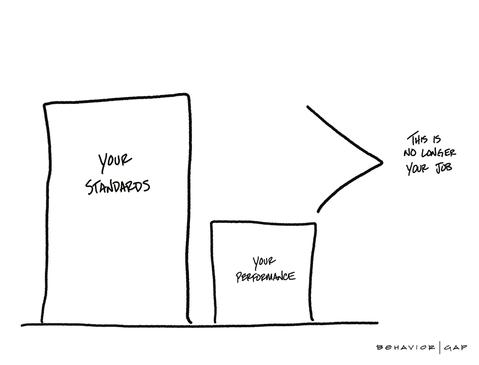
You’re fired.
No, seriously. Pack up your stuff and get out.
But let me be clear: The job you’re fired from is one you never should have had in the first place — being a critic of your own work.
Done, finished, not your job anymore. When you finish creating something and you start to wonder if it’s any good… nope! Don’t try to answer. You no longer get to decide.
If you need me to fire you, awesome, consider it done. But in fact, what would be even better is if you fire yourself.
Let me tell you why.
Five or six years ago, when I first started writing the weekly Sketch Guy column, I would have pieces I was certain would go viral. I said to myself, “I nailed it, everyone’s going to love it, a million people are going to share it!” And then, I would hear nothing. For some reason, it just didn’t get the play — no comments, no feedback, nothing.
Then there were times when I was completely surprised in the opposite way. I’d be running late for a deadline, have something I wasn’t sure of or that excited about, but it was all I had. So, I would send it in expecting some sort of reprimand. And next thing I knew, it had made the sitewide most-emailed list.
I had this experience enough times to realize that I was simply terrible at judging whether my work was good or not. And guess what? So are you. You’re just too close to it.
Fortunately, it doesn’t have to matter, as your job now officially has nothing to do with deciding if the work is good. Your job is to do the work, put it out there, and let the world decide.
Now, I know that sounds scary. But let’s be dead clear about something: You’re not John Steinbeck (and neither was he, at the start). You have to get there first. And the only way to do that is through practice and criticism. But the only way to get practice and criticism is to make and share your work.
This isn’t just about writing. It’s about anything meaningful you do. Singing, painting, entrepreneurship, giving financial advice, museum curating, boat building, skiing, whatever. No matter what it is, your job is to do the work, to become the best you can be.
Not long ago, a reader from Florida named Chip Scanlan sent me an email on this very subject. He turned me on to a great quote from “Writing the Australian Crawl: Views on the Writer’s Vocation,” by William Stafford: “The so-called ‘writing block’ is a product of some kind of disproportion between your standards and your performance.”
But Chip’s words about self-criticism were even more apropos. “Whenever I’m blocked… I lower my standards. Correction, I do my best to not have any standards at all. I abandon my standards. I urge myself to write badly, and once I do that my fingers begin to fly, and the inner critic is powerless.”
Think of how liberating it would be to free yourself from the role of being your own harshest critic. What might you achieve? What work would you put out there for the world to see?
What might happen if you took all the energy that goes in to judging your work and put it right back into the wellspring of creating the work instead?
This column, titled Free Yourself of Your Harshest Critic, and Plow Ahead, originally appeared in The New York Times on June 13, 2017.
. . .